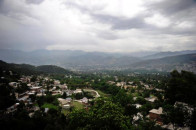AIOU, NUML told to clear six years worth of taxes
SC dismisses review petitions, notes that not receiving a tax notice does not absolve them of paying taxes

PHOTO: FILE
This was directed by a three-member bench of the Supreme Court, led by Chief Justice of Pakistan (CJP) Asif Saeed Khosa and comprising Justice Gulzar Ahmed and Justice Sheikh Azmat Saeed, who dismissed review petitions filed by the varsities.
The Allama Iqbal Open University (AIOU) and the National University of Modern Languages (NUML) had submitted review petitions. AIOU’s counsel argued before the bench that from 1995 to 2001, the varsity had received no notice to pay any kind of tax.
However, in 2001, they received a notice which demanded that they pay all taxes outstanding since 1995.
Upon hearing this, the CJP remarked that paying tax was a social responsibility and that not receiving a notice did not automatically waive this responsibility.
Furthermore, Justice Gulzar said that the notification issued in 2001 had precedence over the notification which was previously issued in 1995. He added that the new notification had minor changes.
AIOU’s counsel further contended that the high court had ordered both universities to pay tax from 1995 but both universities had challenged it in the superior court. He went on to argue that as is a precedence in various cases, petitions become infructuous.
At this, CJP Khosa remarked that the nature of the case was such that law is to be declared and that such cases do not become infructuous.
Justice Ahmed remarked that this is a matter of paying tax and that it is not possible that one institution pays tax while other does not.
AIOU’s counsel contended that educational institutions are exempt from paying taxes.
At this, the state prosecutor said that only government and semi-government institutions were initially exempt from paying taxes, but this changed after tax was imposed according to a notification in 1995. Now, he said, only welfare organisations are exempt from tax.
With regards to NUML, the court noted that through a letter the varsity had requested an adjournment.
The bench remarked that adjournments cannot be granted in review petitions while the court observed that the review petitions did not meet the required criteria. Hence, NUML’s petition was rejected along with that of AIOU.
Man sentenced to death
A man was awarded the death penalty by a district and sessions court on Thursday for allegedly killing a man.
District and Sessions Judge Sohail Nasir heard the arguments and pronounced the verdict in light of the evidence presented before the court.
He ruled that Haider Gul, the suspect, should be hanged until death for shooting Faqeer Muhammad in December 2018 within the remits of Golra Police Station.
However, Gul was granted the right to an appeal the verdict before the high court within a week.
Defense secretary summoned
The Lahore High Court (LHC) Rawalpindi bench on Thursday summoned the federal defence secretary for allegedly violating orders of the Missing Persons Commission.
While hearing a case pertaining to the disappearance of Dr Abdullah from Garden Town in Lahore nine years ago, his lawyer Advocate Inamur Raheem told the court that a case of the incident had been registered in the Garden Town police station.
The counsel added that the Supreme Court (SC) sent the case to the Missing Persons Commission. The commission conducted its inquiry and the related institutions confirmed that Dr Abdullah had been arrested. Subsequently, the commission issued a production order for the suspect.
But the order was allegedly disregarded as Dr Abdullah was never presented before the commission.
The court subsequently issued a notice to the defence secretary to appear before the court on July 15 to explain himself.
Lawyer’s strike continues
As a strike by lawyers continued for the eighth consecutive day, the justice system in the lower courts of Rawalpindi has come to a standstill.
The lawyers went on the strike after police failed to register a first information report (FIR) against a sitting civil judge who allegedly threw a paperweight at a lawyer, injuring him, while hearing a case.
A meeting between the district and high court bar officials with the LHC Chief Justice Shamim Khan also failed to defuse the situation.
The strike meant that litigants, who were due to have their cases heard in 65 different civil and family courts, had to return empty-handed.
Matters were made worse after the lawyers closed the main gate of the judicial complex.
The district bar officials have said that the strike will continue until a case against the relevant civil judge was registered under sections mentioned in the application.
Owing to the strike, the courts adjourned up to 31 cases.
Published in The Express Tribune, July 12th, 2019.



















COMMENTS
Comments are moderated and generally will be posted if they are on-topic and not abusive.
For more information, please see our Comments FAQ